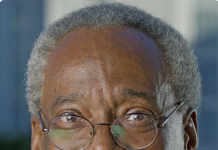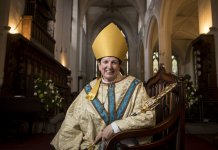Amid ongoing Russian aggression, the Message from the Synod of Bishops of the Ukrainian Greek Catholic Church (UGCC) in Ukraine on War and Just Peace in the Wake of New Ideologies “Rescue the victim from the hands of the oppressor” emphasizes that the current situation leaves Ukraine with no choice but to defend itself militarily.
“This war,” the text reads, “is a national liberation struggle of the Ukrainian civil nation for the right to its existence and future, for the independence, freedom, and dignity of our citizens.”
Analyzing the events of recent decades that led to the dominance of totalitarianism in Russia, the UGCC bishops emphasize the big mistake the Free World made after the collapse of the communist bloc. Democratic countries, they argue, failed to demand complete condemnation of the crimes during the communist era from post-Soviet Russia, recognized as the Soviet Union’s successor, and did not force the new Russian rulers to ensure decommunization, lustration, and cleansing of their state from the consequences of totalitarianism.
The UGCC Synod members believe the new Russian tyranny of the twenty-first century resembles the twentieth century’s totalitarianisms, primarily due to its ruthless opposition to human freedom and dignity.
Its totalitarian features of the past have evolved into much more insidious and, therefore, even more dangerous hybrid forms. Contemporary Russian totalitarianism no longer claims to have positive content or a holistic theory; instead, it propagates nihilism in its worst forms, aiming to morally corrupt and dehumanize individuals, turning them into unwilling, morally indifferent instruments of crimes against humanity. It seeks to undermine faith in any moral principles and tempts its subjects with the opportunity to commit violence against others with impunity.
“Moscow’s Ruscism,” the text reads, “utilizes the achievements of information technology, particularly social media. To some extent, the digital revolution helps Russian propaganda in creating another, virtual world that radically differs from reality and, moreover, distorts it. In its practical actions, in producing fakes and postulating post-truth, modern Russian propaganda relies on the fruits of some of the most radical trends of philosophical postmodernism of the end of the last century, which denied the existence of objective truth that could be verified and asserted that there are no natural principles of morality and law. Therefore, modern Russian tyranny can be called not only hybrid but also postmodern totalitarianism.”
Concerning Ukraine, the bishops claim that these features of hybrid totalitarianism are superimposed on another crucial factor: the colonizing legacy of imperial and tsarist Russia.
During the second half of the 17th and 18th centuries, most of the territory traditionally inhabited by Ukrainians, then known as Ruthenians, was annexed by Muscovy, which later became the Russian Empire. Since then, imperial authorities have banned and suppressed Ukrainian culture, language, Church, and identity, claiming that Ukrainians are only a younger, minor, secondary part of the Russian people. According to numerous public texts and speeches by contemporary Russian leaders and propagandists, this traditional Moscow imperial ideology has acquired a radical militant character today, calling for the complete destruction of the Ukrainian state and Ukrainian identity.
“The war waged by Russia against Ukraine bears all the hallmarks of a neo-colonial war on the European continent, with clear signs of genocide. The destruction of Ukrainian identity has become a political agenda of the Russian leadership, a mania supported by a significant portion of the citizens of the aggressor state, indicating an unhealthy state of Russian society,” the UGCC Synod assures.
Therefore, the hierarchs emphasize that calls for a simple compromise between Ukraine and Russia lack foundation and fail to grasp the reality. The problem goes beyond mere immorality, as these calls disregard the principles of respect for human dignity and just peace. They are simply unrealistic: compromise is impossible when one party denies the very existence of the other.
Simultaneously, the Russian Orthodox Church finds itself attempting to fill the ideological void created by the fall of communism. Viewing religion as a tool for strengthening state power, the Moscow Patriarchate engages in blending of symbols and ideologies of the past. This reflects the Moscow Church’s long, centuries-old tradition of serving the Russian government in its various forms, stretching from the Moscow Kingdom and the Russian Empire to the atheistic and communist Soviet Union. This history has culminated in the current intertwining of communist symbols with the mental paradigms of the tsarist era.
Therefore, the bishops say, it should come as no surprise that the Patriarch of Moscow supported and blessed Russia’s criminal war against the Ukrainian people. Such actions align with the Moscow tradition of the Church’s ideological service to the government and its subservience to those in power. Unfortunately, this long-standing imperial tradition, combined with modern post-communist totalitarianism, has led to an actual crime committed by the Moscow Patriarchate: propaganda for war.
For many years, Ukrainian society has tried to convey to the international community that a new aggressive ideology is emerging in Russia, a mixture of resentment, nationalism, and pseudo-religious messianism.
“However, throughout the entire period leading up to the war, our voices went unheard. This ideology, which the Russian authorities have dubbed the ‘Russkiy mir’ (‘Russian world’), has solidified in Russia as the official and only correct one. The role of the Moscow Patriarchate in creating and promoting this ideology is now widely known and undisputed. It is the Russian Orthodox Church that has infused the ‘Russkiy mir’ ideology with a quasi-religious spirit, depicting Russia as the last bastion of Christianity on Earth, resisting the forces of evil. At the same time, the Russian Orthodox Church invests the most lethal nuclear weapons on Earth with an almost sacred status,” the Synod says.
“Ultimately,” the bishops conclude, “this quasi-Christian doctrine has devolved into a full-blown ideology of Ruscism with its cult of the leader and the dead, a mythologized past, the inherent corporatism of fascism, suffocating censorship, paranoid conspiracy theories, centralized propaganda, and culminates in a war aimed at destroying another nation.” Ruscism, as the Synod argues, appears to be a toxic cocktail of Russia’s past ideologies, drawing from the messianic ambitions of the Moscow Kingdom with its ideas of “Holy Rus” and “Third Rome,” and the aggressive imperialism and global domination aspirations of the USSR.










